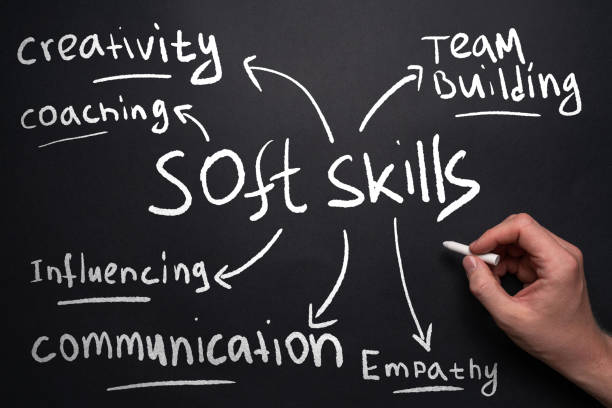As a designer I struggled with accepting the importance of learning soft skills being that I was of the popular opinion where I believed I was a remote worker and so far I give good designs then all is well. It was until my first interview before I knew I was kidding myself. It is important to know that design goes beyond the pixels on a screen or the use of software like Figma. It’s about understanding people, solving problems, and creating meaningful experiences, and while you may be honing your technical skills and unleashing your creative potential in you, there’s an often overlooked aspect that can set you apart in the competitive design landscape – soft skills. Here are 4 soft skills to learn that would help build a relationship with not only your boss, colleagues or friends but would also improve and build a good relationship with your users: 1. Communication: Communication is at the forefront of these skills. As a designer, you must effectively convey your ideas, thoughts, and visions to clients, colleagues, and even stakeholders. Clear communication fosters strong relationships, ensures everyone is on the same page, and paves the way for successful collaborations. Being able to explain your design decisions and receiving constructive feedback will help you grow as a designer. One way to grow and improve this is by joining and interacting in a community like HerTechTrail. 2. Empathy Empathy is another invaluable soft skill. By putting yourself in the shoes of your target audience, you can truly understand their needs, aspirations, and pain points. Empathy enables you to create designs that resonate deeply, forging emotional connections and leaving a lasting impact. Embracing empathy will make your designs and thoughts user-centred, intuitive, and inclusive. 3. Collaboration Collaboration is the backbone of any design. As you embark on projects, you’ll find yourself working with diverse teams, each member bringing their expertise and perspectives. Collaborative skills allow you to navigate different ideas, find common ground, and create positive solutions. It is crucial to embrace teamwork, active listening, and embracing different viewpoints. 4. Problem-solving Problem-solving is the stronghold of a great designer. Soft skills such as critical thinking, adaptability, and resilience equip you to navigate the inevitable challenges and roadblocks along the way. By approaching design problems with a growth mindset and a willingness to explore alternative solutions, you’ll find yourself overcoming obstacles and pushing the boundaries of your creativity. Finally, in the fast-paced and ever-evolving design industry, possessing a soft skill is what sets extraordinary designers apart from the crowd. Learning and understanding design theories and law make the foundation, but the integration of soft skills truly showcases your potential as a designer. So, as you embark on your design journey, remember to nurture your soft skills alongside your technical abilities. Seek opportunities to enhance your communication, empathy, collaboration, and problem-solving skills. Embrace the power of effective communication, understand the people you design for, collaborate with diverse teams, and approach problems as exciting challenges to conquer. Ayomide Adekoya Design community Lead
Category Archives: Soft Skills
INTRODUCTION While technical knowledge and industry expertise are vital, let us reveal the secret sauce that separates great product managers—soft skills! You read that correctly. Let’s look at how soft skills can help you advance in your job as a product manager and achieve success. “Must Haves” Soft Skills of a Product Manager 1. Empathy As a product manager, you must use empathy to comprehend your users’ wants and pain points. Create products that resonate with the wishes and desires of your users by developing deep listening skills and putting yourself in their shoes; this will make you stand out as an intelligent and customer-focused product manager. 2. Communication You must communicate in clear terms if you want to succeed as a product manager. Your words should be able to unite everyone, whether communicating with stakeholders or giving team members precise instructions. Remember that the secret is to be both a compelling speaker and an attentive listener. Embrace the power of body language, have honest and open interactions, and master concise messaging. 3. Collaboration Product managers serve as a link between diverse teams, bringing them together to create something beautiful. Bring your team’s talents and viewpoints together to produce something genuinely unique. 4. Problem-Solving and Critical Thinking Daily, product managers deal with a wide range of complicated challenges. You can face these difficulties head-on by developing excellent problem-solving and critical-thinking abilities. To find creative answers, hone your analytical skills, adopt a data-driven strategy, and think proactively. With this ability, you can solve even the most complex problems and turn them into chances for innovation as a product manager. 5. Adaptability Adapting to evolving circumstances, market trends, and consumer wants is a constant in the dynamic world of product management. It’s essential to have the capacity to adapt rapidly, embrace change, and be adaptable. Develop adaptability by keeping up with market trends, asking for input and refining your ideas, and being receptive to fresh ideas and approaches. Conclusion Technical proficiency may open doors, but the mastery of soft skills catapults product managers to success. By developing your soft skills, you’ll be able to handle challenges with finesse, forge solid connections, and produce top-notch products. If you decide to invest in your professional development, you’ll be able to lead your team, promote innovation, provide exceptional goods, and go above and beyond. Bonus Tip Soft skills take time to develop. Continuously Look for possibilities for professional and career improvement, go to industry gatherings, participate in workshops, and interact with communities of product managers to benefit from their experiences. Adopt a growth mentality, be inquisitive, and commit to lifelong learning. Ann Ezeogu Product Management Community Lead


